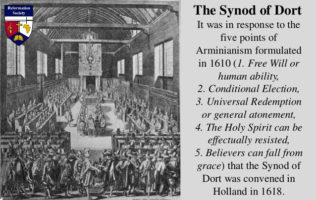
The 400th Anniversary of Dort
Jacobus Arminius challenged the bedrock doctrines of the Reformation—but the Reformed churches pushed back. On this episode of 5 Minutes in Church History, Dr. Stephen Nichols interviews Dr. W. Robert Godfrey on the Synod of Dort and why we still celebrate its anniversary 400 years later.
Stephen Nichols: Today, we are visiting again with a friend of ours, Dr. Robert W. Godfrey. Good to see you, Dr. Godfrey.
Robert Godfrey: Thank you. Great to be here with you.
SN: You were the president of Westminster Seminary California, and you are a teaching fellow for Ligonier Ministries, chairman of the board for Ligonier, author of a number of books, and a church historian.
RG: Correct.
SN: I want to talk to you about an event that I know means a lot to you. What is the significance of 2018 and 2019 when it comes to an important anniversary in church history?
RG: Well, the good news for us is we get two years to celebrate this anniversary. We only got one year for Luther in 2017 but this year begins two years of celebration for the meeting of the Synod of Dordrecht.
 SN: Dordrecht is a city in the Netherlands. Often times, when we refer to the Synod of Dordrecht, we shorten Dordrecht to Dort. This was a synod that was convened in 1618.
SN: Dordrecht is a city in the Netherlands. Often times, when we refer to the Synod of Dordrecht, we shorten Dordrecht to Dort. This was a synod that was convened in 1618.
RG: Yes—the endlessly fascinating church synods. Well, church synods are not normally fascinating, actually, but occasionally in history there are important church meetings, and the Synod of Dort was a very important one.
SN: Last week, we explored the historical background of the Synod, Jacobus Arminius and the document written by his followers in 1610, the Remonstrance.
RG: Right.
SN: The Synod Dort was largely a response to that document.
RG: Right. I always tell my Dutch Reformed friends the only way to keep Dutch Reformed people humble is to remind them the only really famous theologian the Dutch Reformed church has ever produced was Arminius. Yes, Arminius challenged the settled Calvinism of the Dutch Reformed churches and it led to tension and pressure in Dutch society.
SN: It was a huge controversy.
RG: Finally, then a synod was called which turned out not to be just a national synod but an international synod. Most of the reformed churches in Europe were represented at the Synod of Dort, and it became a great formulation of the Calvinist response to the Arminian challenge.
SN: We covered some of the particulars of the Canons of Dort previously. It has five heads of doctrine that are often summarized by the acrostic TULIP, and under those heads of doctrine there are numerous articles affirming them. There is also a section under each head outlining what the Synod was rejecting—the Canons are not just what the Synod was affirming as true but what it was rejecting as false. As you think about the Synod, could you highlight what the significance of Dort was in its time, and what its significance might be now, four hundred years later?
RG: Well, I just finished a book for Reformation Trust that will be released in March. You’ll all want to buy multiple copies to give to your friends. I’ve titled it Saving the Reformation. I don’t think that’s too much of a claim because the reaction of the Calvinists in the Netherlands to Arminius understood that his challenge of the doctrine of election was an attack on grace alone, that his exposition of sin and grace was a challenge to faith alone, and that his rationalizing tendency in theology was a challenge to Scripture alone. These are the bedrock issues of the Reformation, and they were being challenged in subtle ways, so I think the Calvinists rightly saw this as an assault on the essentials of the Reformation. Franciscus Gomarus, one of the important Dutch theologians at the Synod of Dort, said that he opposed Arminius primarily because he saw him assaulting the doctrine of justification by faith alone. All of these theological issues are interrelated, and I think Dort was about saving the Reformation.
SN: In one sense, we need to save the Reformation in every century, so that’s the Synod’s significance today as well?
RG: Right. You could argue if you are mean-spirited—and I am—that Arminianism is a sort of default position that seems reasonable to us, as if to think “Surely man must have abilities to respond to what God offers them.” I believe the Bible says, “No, that’s not true, and it is by grace alone that we’re saved.”
SN: Well, I would agree with everything you said Dr. Godfrey, except the part about you being mean-spirited. Thank you, Dr. Godfrey.
RG: Thank you.
Stay connected with 5 Minutes in Church History by getting the weekly podcast on iTunes, SoundCloud, or via RSS. You can also subscribe to the blog via RSS and follow us on Twitter and Facebook.
(This podcast is by Ligonier Ministries. Discovered by Christian Podcast Central and our community — copyright is owned by the publisher, not Christian Podcast Central, and audio is streamed directly from their servers.)